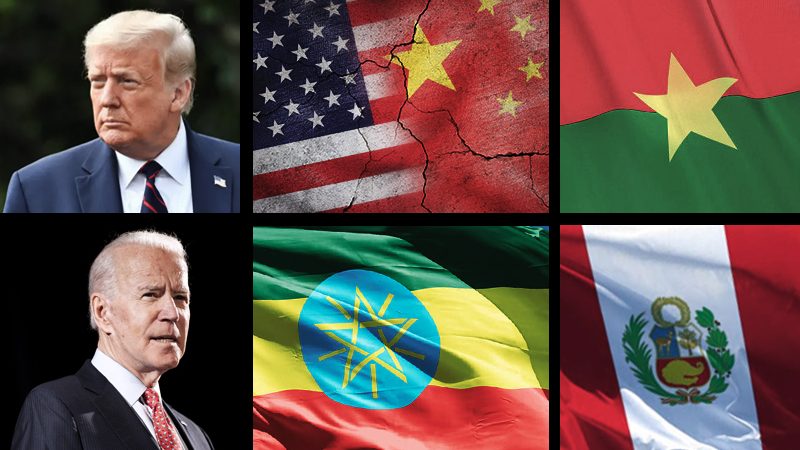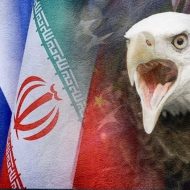US obscurity: legal wars
The results of the presidential elections in the US are still unknown. The candidates – Democrat Joe Biden and Republican Donald Trump – each consider themselves the winner. Despite the statements of mainstream media supporting Biden, there are no real results. The plan is for the United States to confirm the election results by the critical date of December 8.
Meanwhile, the controversy has led to President Trump launching a legal procedure against alleged electoral fraud. Certification is usually just a formality, but this year the process has taken on a new meaning, as Trump’s team of lawyers is trying to prove that Biden’s preliminary “victory” results are based on electoral manipulation. The Trump team will try to achieve results in the Electoral College, which votes on December 14.
The idea is that if there is no certification, the republican state legislatures in several key states – especially Michigan and Pennsylvania – can appoint Trump supporters in the Electoral College. In that case, Trump may still have a chance to win.
Despite the unconfirmed results and controversy, Biden already considers himself the winner and has announced the new Secretary of State Antony Blinken. During Barack Obama’s first term as President from 2009-2013, Tony Blinken served as National Security Adviser to Vice President Biden, where he helped develop US policy on Afghanistan, Pakistan and the Iranian nuclear programme. In the 2013 profile, he was described as one of the key players in the government’s policy development in Syria. In other words, if Biden’s victory is recognised, the Secretary of State will pursue a tough policy in the spirit of Obama and will have a negative impact on the international environment. It is possible that the Greater Middle East plan will be reactivated.
Elections in Burkina Faso
On Sunday, Burkina Faso’s national elections came to an end under difficult circumstances – the majority of the population voted during the imminent threat of jihadist violence.
Roch Kabore is likely to become new president, he is running for a second five-year term against 12 other candidates, promised to ensure the security and stabilization of the country.
The 63-year-old Kabore is expected to win, although he is in a tough race with opposition candidates; Zephirin Diabre, 61, a former finance minister from Progress and Change Party, who won second place in the 2015 elections; and Eddie Komboigo, chairman of the Congress for Democracy and Progress Party of former President Blaise Compaore, who was overthrown by an uprising in 2014 after 27 years of rule.
Burkina Faso is a dangerous zone given its highly unstable environment – Mali, Niger, Ivory Coast.
It is important to note that Burkina Faso is part of the Sahel zone, one of France’s areas of direct interest. Meanwhile, the destabilisation situation in the country demonstrates that Paris’ military interventions do not lead to effective results – on the contrary, the number of terrorist attacks has increased in recent years. The largest terrorist attack in the last 5 years was the attack by the group “Islamic State in West Africa” (Iswap) on 27 December 2019 in Arbinda, during which seven soldiers and 35 civilians were killed.
The US geopolitical attack on China
Several events in the US-China standoff caught our attention over the past week.
-Tibetan pseudo-“leader” visited the USA
The head of the so-called “Tibetan government in exile” visited the White House for the first time in six decades – a step that could further anger China, accusing the US of trying to destabilise the region.
Lobsang Sangay, president of the separatist “Central Tibetan Administration” (CTA), was invited to Washington to meet with officials on Friday.
Although Tibet is an integral part of China, the current visit of the odious separatist leader means that Washington intends to continue to move towards a rapprochement with Beijing, without fearing to use any method in the fight against China.
– US Navy Admiral’s visit to Taiwan
China will respond to the news of the visit of a US Navy Admiral to Taiwan, being strongly opposed to any military relations between the separatists in Taiwan and Washington, said the Chinese Foreign Ministry on Monday.
The Chinese Foreign Ministry has praised their ties with Taipei.
The Trump administration has increased its support for Taiwan’s separatist authorities, including through new weapons supplies, which is alarming to China. Foreign Ministry spokesman Zhao Lijian said China “resolutely opposes” any form of exchanges between the US and Taiwanese officials or the two having military relations.
– Punishment of Joshua Wong (Hong Kong)
Joshua Wong, a pro-Western activist who led recent destabilisation and chaos in Hong Kong and his colleagues Ivan Lam and Agnes Chow plead guilty to various charges related to the recent violent demonstrations.
The mainstream media immediately began to publish angry information about the alleged ‘arrest’ of Wong and his colleagues, although China has not yet imposed any sanctions. Thus, major English-language publications have criticized the “dictatorship of China” for “suppressing democracy” in Hong Kong.
Meanwhile, they try not to mention the fact that Hong Kong is an official part of China.
Perhaps the increasing pressure is due to China’s strengthening position in a number of industries and its geopolitical influence on different continents. Bloomberg said that China is increasing its refining capacity, and next year the country may replace the US as a leader in this market.
The authors of the publication note that the US has been leading in oil refining since the beginning of the oil era in the mid-19th century, but China will overthrow the US already next year.
Meanwhile, Chinese experts for the most part believe that even when compared to the pressure of the Trump administration, things will be worse for US-Chinese relations under Biden.
China should give up the illusion that its relations with the United States will automatically improve under the administration of President-elect Joe Biden, Zheng Yongnian, the Dean of the Advanced Institute of Global and Contemporary China Studies, a Shenzhen-based think tank, said. He told the South China Morning Post that Beijing must be prepared for Washington’s tough position.
“He is certainly a very weak President, if he can’t sort out domestic issues, then he will do something on the diplomatic front, do something against China. If we say Trump is not interested in promoting democracy and freedom, Biden is. (President Donald) Trump is not interested in war… but a Democratic President could start wars.”
Chaos in Peru
The Congress of Peru has chosen Francisco Sagasti as the interim president of the country in an attempt to defuse an acute political crisis following angry protests and the departure of the two presidents last week.
Sagasti will be the third acting president of Peru a week after the interim leader, Manuel Merino, resigned on Sunday, five days after he was sworn in after the impeachment of centralist Martin Viscarra.
The removal of Viscarra, who was popular among many Peruvians, sparked many days of protests that led to the death of two people.
Sagasti received 97 votes in favour and 26 against and is due to complete the mandate of the current government, which ends in July 2021 and will include general elections on April 11.
Sagasti, a former official and employee of the World Bank, faces a huge challenge to bring stability to Peru, which has already been hit hard by Covid-19 and is moving towards its worst economic recession in a century. However, given his past work at the World Bank, one can hardly expect anything more from the President than the use of long discredited neoliberal recipes. This means that the destabilization in Peru will only increase.
War in Ethiopia
Serious military action is unfolding in Ethiopia.
Ethiopian Prime Minister Abiy Ahmed delivered a three-day ultimatum to troops in the northern region of Tigray before the military launched an offensive against the regional capital Mekelle.
Abiy accuses the state leadership – Tigray People’s Liberation Front (TPLF) – of rebellion against the central government and an attack on federal troops in the city of Dansa on November 4. Insurgents say his government has marginalised and persecuted the Tigrayans since it took office two years ago.
Abiy’s statement came a few hours after an Ethiopian army spokesman said that the army planned to surround Mekelle with tanks and could attack with artillery in order to end the nearly three-week war, calling on the civilian population to “save themselves”.
Countries in Africa and Europe are calling for a truce, but Abius refuses.
The TPLF sees itself as a defender of its own sovereignty. From 1991 to 2018, this party was de facto governing in Ethiopia after the TPLF, along with other Ethiopian national movements from (the Ethiopian Revolutionary Democratic Front (EDPF) and separatists from Eritrea, overthrew the Maxist regime of Mengistu Haile Mariam. The military operation against the TPLF is thus driven by a multitude of factors: the struggle of the liberal policy of Abiy Ahmed with the main opposition force, the basis of the old regime, the redesign of the economy (Abiy Ahmed’s desire for privatisation and the leading position of the TPLF in many sectors of the economy), and the ethnic factor – the revenge of other ethnic groups (primarily Amhara) after almost 30 years of Tigrayans rule. Amhara militia is actively involved in the conflict on the side of the federal troops.
The terrain in Tigray favours the TPLF, which is very well armed and equipped. They have a lot of experience – they have fought in these mountains for decades, and the longer this continues, the more resentment will accumulate and the harder it will be to resolve this conflict. And this, in turn, destabilizes the whole region, because Tigray is located next to Eritrea and Sudan.
This has the potential to destabilize the region and could lead to the massive displacement of the population of Africa’s second largest country, with 110 million people. Ethiopia was seen as an essential element in maintaining peace in the unstable Horn of Africa – but this could be negated by the war that has spilled over to Eritrea and the fact that some 96,000 Eritrean refugees living in Tigray could leave the place again – most likely to Sudan – and already overcrowded refugees.
Ethiopia has also been forced to temporarily withdraw from its peacekeeping mission in neighbouring Somalia.
Macron criticizes African competitors
French President Emmanuel Macron is accusing Russia and Turkey of spreading anti-French sentiment in Africa:
“We must not be naive on this subject: many of those who speak, who make videos, who are present in the French-speaking media are funded by Russia or Turkey,” Macron said on Friday in an interview with the Jeune Afrique magazine, while accusing Moscow and Ankara of trying “to play on post-colonial resentment”.
However, Macron blames Turkey for the conflict within France – with the beheading of a teacher showing cartoons of the Prophet Mohammed – even though he himself is divided by ethnic, religious, political and economic factors.
Macron’s accusations against Turkey and Russia are linked to the fact that these countries are challenging French neocolonialism in Africa. On the other hand, it is advantageous for Macron to attribute his anti-French sentiments to some third forces, turning a blind eye to the fact that the French themselves, by imposing unequal relations on Africans, are responsible for Africans’ mistrust of Paris politics.









Leave a Reply